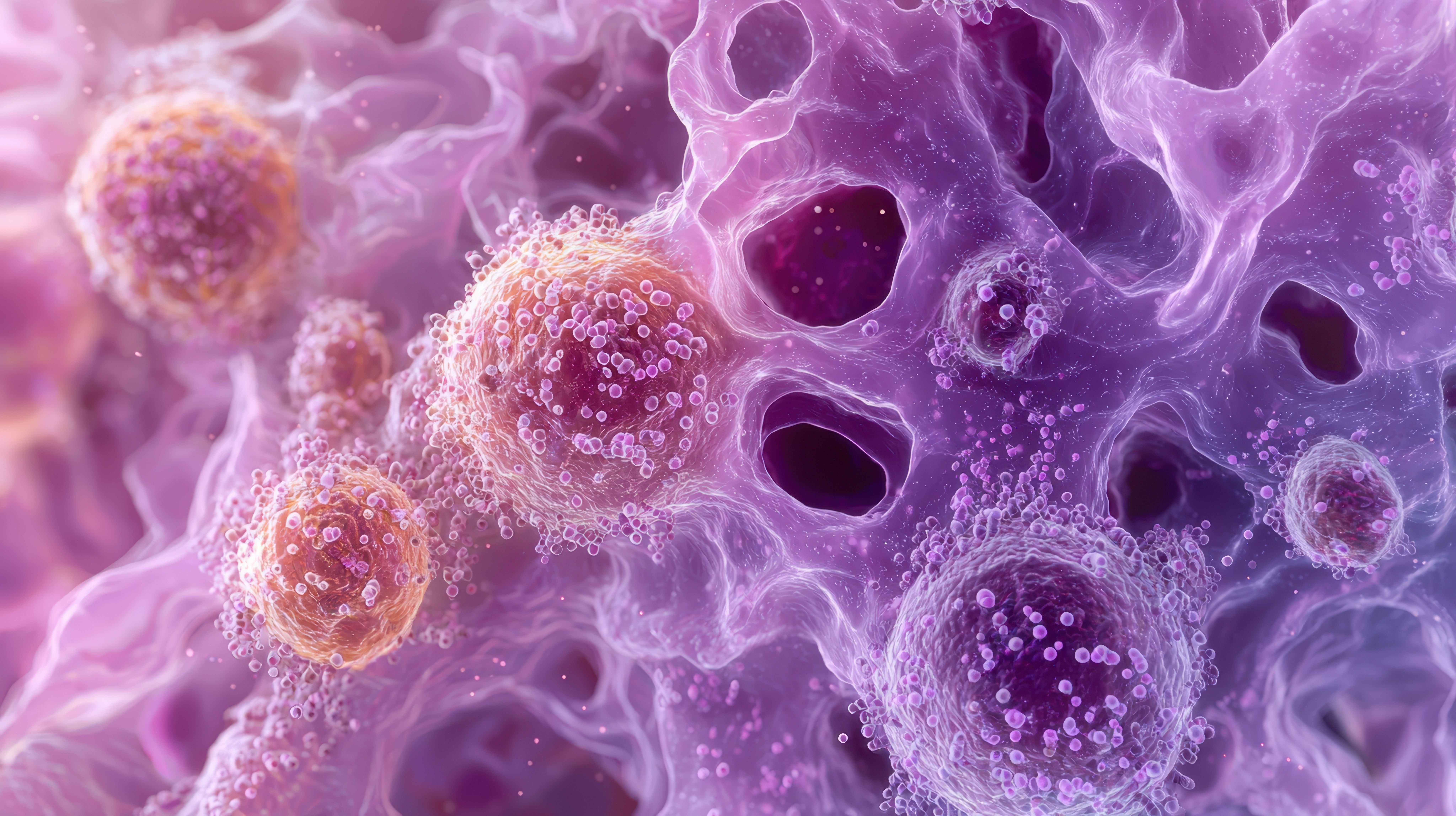News
Article
Bemarituzumab Elicits Positive Overall Survival in FGFR2b-Positive First-Line Gastric Cancer
Author(s):
Key Takeaways
- Bemarituzumab plus chemotherapy significantly improves overall survival in FGFR2b-overexpressing, non-HER2 positive gastric cancer patients.
- The FORTITUDE-101 trial highlights a major advancement in targeted therapy for gastric cancer, addressing the need for effective treatments.
The fibroblast growth factor receptor 2b (FGFR2b)-inhibiting bemarituzumab demonstrated improvements in overall survival and other key secondary end points compared with placebo in first-line gastric cancer.
Results from the phase 3 FORTITUDE-101 clinical trial have demonstrated the effectiveness of first-line bemarituzumab plus chemotherapy, with a statistically significant and clinically meaningful improvement in overall survival (OS) in patients with unresectable, locally advanced, or metastatic gastric or gastroesophageal junction (G/GEJ) cancer with fibroblast growth factor receptor 2b (FGFR2b) overexpression and who are non-HER2 positive.1
Image Credit: © Crystal light - stock.adobe.com

"Most patients with gastric cancer are diagnosed at an advanced stage, with poor prognosis, low survival rates, and limited therapeutic options," Jay Bradner, MD, executive vice president of research and development at Amgen, said in a news release announcing the positive trial results. "These first positive top-line results of an FGFR2b-targeted monoclonal antibody from our phase 3 FORTITUDE-101 study mark a meaningful advance in the development of effective targeted therapy for gastric cancer."1
Trial Results
With a major lack of effective treatment options for patients with gastric cancer, new research into possibilities is sorely needed. Investigators of FORTITUDE-101, a randomized, multi-center, double-blind, placebo-controlled phase 3 study, sought to evaluate bemarituzumab plus chemotherapy (modified 5-fluorouracil, leucovorin, and oxaliplatin [mFOLFOX6]) compared with placebo plus mFOLFOX6 as first-line therapy in patients with advanced G/GEJ cancer with FGFR2b overexpression. The trial enrolled 547 patients across 300 sites in 37 countries.1
Primarily, the authors measured OS in patients with FGFR2b overexpression, defined as 2+/3+ staining in 10% or more of tumor cells by centrally performed immunohistochemistry (IHC) testing. Critical secondary end points included progression-free survival (PFS) and overall response rate (ORR). To ensure the validity of the results, patients were excluded from FORTITUDE-101 if they harbored a human epidermal growth factor receptor 2 (HER2) mutation.1
As mentioned, bemarituzumab elicited a major improvement in OS in the patient population compared with placebo. Regarding safety, the most observed treatment-emergent adverse events (TEAEs) in patients with the treatment regimen were reduced visual acuity, anemia, punctate keratitis, neutropenia, nausea, corneal epithelium defect, and dry eye. The ocular events were consistent with phase 2 trial results, and although they occurred in both arms, the investigators noted they were observed with heightened severity and frequency in the phase 3 bemarituzumab arm.1,2
Amgen noted in their news release that FORTITUDE-101 featured more comprehensive ocular-related monitoring than previous studies of bemarituzumab. More detailed results from the trial are to be presented at a future medical meeting, Amgen noted.1,2
Impact of Gastric Cancer
Gastric cancer constitutes a major global burden for millions, especially among patients with advanced or resectable G/GEJ cancer, who face poor outcomes. FGFR2b has emerged as a biomarker that promotes aberrant signaling when overexpressed, leading to the proliferation of tumor cells. In approximately 38% of patients with advanced G/GEJ cancer, the FGFR2b protein is found to be overexpressed.1
The GEJ is where the esophagus meets the stomach and is where gastric cancer is most likely to start in the United States. Symptoms aren’t often clear in the beginning stages of the illness and may not occur until the cancer is more advanced. In later stages, symptoms can include extreme fatigue, vomiting blood, rapidly losing weight without trying, and having black stools.3
Bemarituzumab, a first-in-class, afucosylated, humanized IgG1 anti-FGFR2b monoclonal antibody, has demonstrated significant potential to transform the treatment paradigm of G/GEJ cancer. Prior to this phase 3 trial, the phase 2 FIGHT study investigated bemarituzumab plus chemotherapy in patients with FGFR2b G/GEJ cancer and demonstrated improved PFS compared with placebo. Currently, investigators are working to further confirm bemarituzumab’s efficacy in a phase 3 trial of the drug in combination with chemotherapy and nivolumab in patients with first-line gastric cancer. Data from that trial is expected in the second half of 2025.1,2,4
“Systemic chemotherapy is the standard of care for this deadly and aggressive form of gastric cancer,” Zev A. Wainberg, MD, associate professor of medicine at the University of California, Los Angeles, said upon the publication of the FIGHT trial results. “Treatment with bemarituzumab in combination with chemotherapy can deliver a significant reduction in the risk of disease progression and death in [patients with gastric cancer] whose tumors overexpress FGFR2b.”2
REFERENCES
1. Amgen. Amgen announces positive topline phase 3 results for bemarituzumab in fibroblast growth factor receptor 2b (FGFR2b) positive first-line gastric cancer. News Release. Released June 30, 2025. Accessed July 8, 2025. https://www.amgen.com/newsroom/press-releases/2025/06/amgen-announces-positive-topline-phase-3-results-for-bemarituzumab-in-fibroblast-growth-factor-receptor-2b-fgfr2b-positive-firstline-gastric-cancer
2. Antrim A. Bemarituzumab, chemotherapy show potential for treatment of gastric, gastroesophageal junction cancers. Pharmacy Times. Published February 16, 2021. Accessed July 8, 2025. https://www.pharmacytimes.com/view/bemarituzumab-chemotherapy-show-potential-for-treatment-of-gastric-gastroesophageal-junction-cancers
3. Mayo Clinic Staff. Stomach cancer. Mayo Clinic. Last Updated June 19, 2024. Accessed July 8, 2025. https://www.mayoclinic.org/diseases-conditions/stomach-cancer/symptoms-causes/syc-20352438
4. Wainberg ZA, Enzinger PC, Kang YK, et al. Bemarituzumab in patients with FGFR2b-selected gastric or gastro-oesophageal junction adenocarcinoma (FIGHT): a randomised, double-blind, placebo-controlled, phase 2 study. Lancet Oncol. 2022;23(11):1430-1440. doi:10.1016/S1470-2045(22)00603-9
Newsletter
Stay informed on drug updates, treatment guidelines, and pharmacy practice trends—subscribe to Pharmacy Times for weekly clinical insights.





